Rethinking Sustainable Tourism
- Ana Karina Marin
- Apr 8, 2025
- 3 min read
Updated: Apr 17, 2025

Gunayala (also known as the San Blas islands) are a stunning archipelago of over 360 islands off the Caribbean coast of Panama, home to the Guna people. But despite their natural beauty and the community’s deep respect for nature, the islands face a growing problem: plastic waste.
The impact of plastic waste in the islands is major. Bottles, bags, fishing gear, and packaging wash up on the shores of the islands from passing ships, nearby mainland rivers and ocean currents. Turtles, fish, and seabirds often mistake plastic for food, which can lead to injury or death. Coral reefs, crucial to the islands' ecosystems, are also being affected by microplastics and discarded fishing gear.
Not only are our waters heavily impacted, but our land also bears the burden of plastic pollution. Once pristine beaches and ecologically vital mangrove areas are now littered with plastic waste, disrupting both the natural environment and the delicate balance that sustains it.
Plastic pollution also poses a serious threat to the culture and livelihoods of the island communities. For the Guna people, whose lives are deeply intertwined with the sea, declining fish populations and damaged marine habitats jeopardize both a vital food source and a cornerstone of their economy. As traditional ways of life come under pressure, so too does the cultural identity that has sustained these communities for generations.
The islands too depend on ecotourism. Littered beaches and polluted waters undermine the Guna’s ability to attract visitors who come seeking natural beauty and a clean, peaceful escape. The Guna worldview emphasizes harmony with nature, and the presence of plastic waste challenges this spiritual and cultural balance.
That’s why we chose to take initiative—hoping to shine a light on the issue and share our efforts in the hopes of inspiring others to do the same.
In collaboration with our floating community and the transportation companies that shuttle our guests, we've established a collective effort to remove plastic waste from Gunayala. We've launched beach clean-ups aimed especially at empowering local youth with knowledge and pride in protecting their environment. Visitors are invited to be part of this partnership by participating in clean-up efforts and taking their waste with them. We try to pass along this conscious way of ecotourism so that travelers and tourists learn to not leave their plastic waste behind as others have done before them.
Up until now, plastic waste on the islands was often either burned—releasing toxic fumes into the air—or dumped into a local disposal site located directly within the mangroves, a fragile and vital habitat for countless species of wildlife. This not only endangered the local ecosystem but also contradicted the values of harmony and respect for nature that the Guna people uphold.
Today, however, a shift is taking place. Guests are now proudly taking responsibility for the waste they generate, removing the packaging from the food and goods they consume during their stay, and carrying it out of Gunayala. This growing awareness marks a meaningful step toward more responsible, respectful tourism and long-term environmental stewardship.
During their beach time, kids often turn collecting plastic bottles into a fun and meaningful activity, turning play into purpose as they help clear the shores of debris. Their enthusiasm not only contributes to cleaner beaches but also sets a hopeful example for the next generation of ocean stewards.
These small acts of awareness create a big positive impact daily in the communities as well as in the quality and sustainability of eco-tourism around this mesmerizing place. We at Ulu warmly invite you to join our sustainable patrol—right here in Gunayala—and to carry this spirit of care and responsibility with you wherever the waves may lead next.
Together, we can help cultivate a global culture of respect for our lands and oceans, leaving every place better than we found it, no matter where our journeys take us.





Comments